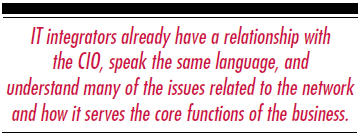Q&A: ISC Advises IT Integrators On Security
By Sandy Jones, special advisor, ISC West
 What’s the most significant trend in the IP security world today?
What’s the most significant trend in the IP security world today?
Providing information in real time. For a user, the investment in technology is about easily obtaining comprehensive information. The more accurate, more comprehensive, and more accessible the information is, the better and more effectively decisions can be made and the right response/action taken. Today, technology is providing this capability through IT-based solutions and open and cloud-based systems, allowing for faster and lower cost storage to mobile applications while giving access to information to those who need to know, wherever they are located in the world.
What do IT integrators need to know to succeed at selling IP security if they’re not already?
Selling security is like selling anything else: You have to understand your customer and make the investment in learning the security world. ISC is a good place to start to gather some of that knowledge. Beyond understanding the security technology itself, there are also regulations, mandates, and other issues that can affect your customer’s business needs.
For example, IT cameras are a common entry point into the security space for IT integrators, as there are many plug and play solutions. But placement, storage issues, and customer objectives must be key considerations. The needs of a customer who wants the cameras for evidentiary reasons are very different from those simply wanting to know someone is in a location where there should not be any people.

Do integrators hold any advantages over traditional security dealers when it comes to the sale and implementation of IP security?
Integrators coming from the physical security space have many security skills already. With any new technology they invest in, they either learn it or hire people with those skills. However, they often have a relationship with the security buyer, but not necessarily with the CIO, who is increasingly either influencing or making the buying decision.
This is where IT integrators can have the advantage. IT integrators already have a relationship with the CIO, speak the same language, and understand many of the issues related to the network and how it serves the core functions of the business.
Again, it is about the customer, so if an IT integrator does not have the confidence needed to undertake a complex security installation, it can collaborate with a physical security integrator. Of course, ISC is the place to meet them directly or through their suppliers at the event.
What can IT integrators new to security learn at a show like ISC?
First of all, integrators can start by attending some of the training sessions. Those start on Tuesday, April 9, the day before the show floor opens. Another way to learn about what is new is to pick up a New Product Showcase directory and visit the booths with products they might want to add to their installations. They should make sure to visit the big booths, as the large companies have many new products.
Finally, integrators should also be sure not to miss visiting the 10-foot booths, as they are often the new entrants that may just hold the best new technology for them. The Security Industry Association (SIA) and PSA Security Network booths are also great resources and can direct them to many other resources.
